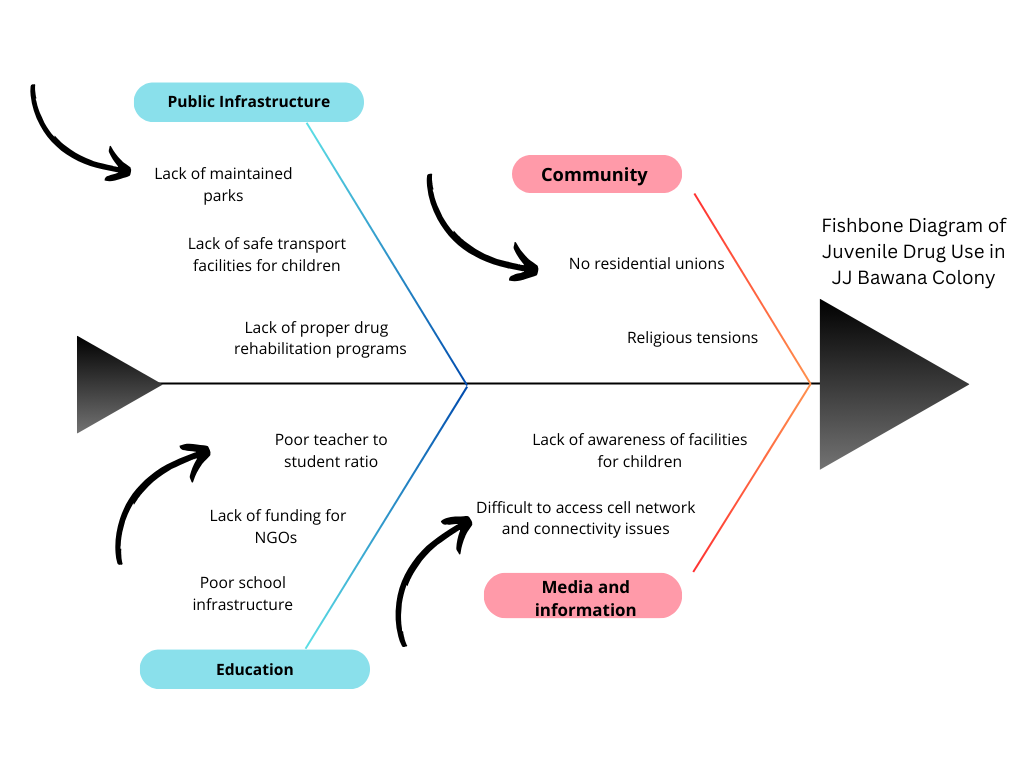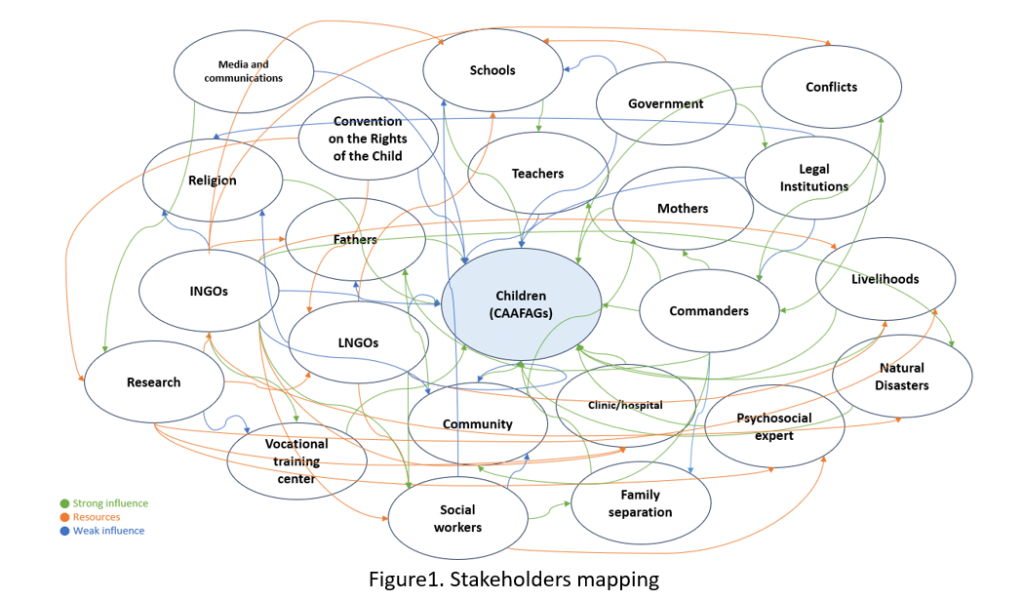
I’ve just spent a busy few days giving feedback on students’ proposals for their assignments in my activism class at the LSE, which I teach along with Tom Kirk. For this they have to pick a topic that they feel strongly about, and design an influencing strategy to achieve a positive change. They have to work through the course content on understanding systems and power, mapping stakeholders and finding plausible points of entry for their campaigns, before coming up with a convincing set of tactics to achieve their goals. Some of the tools they used are included here, with the students’ permission.

Ishikawa (fishbone) diagram, from ‘Influencing strategy for Juvenile Drug use and Crime in JJ Bawana colony, Delhi’, Ashika Thomas.
The exercise also provides an interesting window into what progressive, relatively privileged (the LSE is not cheap), highly educated 20-somethings from around the world care about these days.
Here are the headlines.
Gender issues are the big one (it’s probably no coincidence that 85% of the class are women). 14 projects tackled topics such as gender-based violence, street harassment, girls’ empowerment in schools, defending feminists’ right to protest, the ‘Pink Tax’, FGM, period poverty, pregnancy outcomes, abortion, even combating sexism among one students’ family members!
Next highest (5 proposals) were issues around refugees and migrants, including reforming the Kafala system in the UAE
The next batch got 3 proposals each:
- Education, including two on access to education for marginalized groups such as Spain’s Roma people, or girls from poor families in Kyrgyzstan
- Various aspects of child rights, including foster care provision in the US, the treatment of former child soldiers in the Central African Republic, and child rape survivors in South Sudan
- Housing and Homelessness
- Reforms at the LSE: ending its fossil fuel investments; introducing a School pregnancy policy and (a personal favourite) changing my course to include a week on the use of violence to achieve change
- Environment: Meat consumption; pollution; low emission urban development
Two each on reducing drug abuse and combating right wing populism in Germany and Sweden

Stakeholder mapping for increasing the Tamil Nadu state budget for urban climate change resilience, by Bala Marimuthu
Then a long tail of one-offs on:
- Tackling HIV stigma
- Release of Niger’s former president
- Food insecurity
- Plastics
- Not charging new mothers to take home their placentas (it happens)
- Ban marketing guns to kids
- Voting methods
- Fast Fashion
- False advertising by budget airlines
- Cycling
- Veteran reintegration
- Treatment of prisoners
- Mental health
- Workers’ rights in the UK hospitality sector
- Digital rights
I’d be interested in your thoughts on this list. The things that struck me (aside from their ability to churn out awesome graphics_ included the sheer range of issues about which young people feel passionate – that bodes very well for the future of activism, I would say. Also the low profile of issues such as climate change (one proposal) or trans rights (none) that figure high on the current civil society agenda, at least in the UK.
The students will now digest our feedback and then write their full proposals for early next year. As in previous years, I’ll make sure to put some of their accompanying blogs up here so you can see where they end up.

Systems map for children associated with armed forces and armed groups in the Central African Republic, by Dahui Jeon
Sad to read nothing on corruption and anti-corruption. Sounds like the topic has come to a dead-end.
It is always insightful to read about what people studying similar topics as me are thinking. There is a great diversity of important topics. However, I am surprised that no one mentioned AI. It is still very unclear how this will shape everything we do in the next few years. We need to identify entry points/ approaches to start discussing its potential and threats. But how do we keep the conversation?
Considering the amount of media coverage about the government’s proposed flagship policy of transporting asylum seekers to Rwanda, I’m surprised at the lack of interest in asylum seekers rights and the UK’s practise of processing asylum seekers.
Hi Matthew, this is exactly what I’m doing my project on (which I believed Duncan subsumed into ‘issues around refugees and migrants’). Keen to talk more and hear your insights?
Yes, dismayed so little on climate – or agriculture. Food shortages, hunger, famine are already serious problems that will only get worse. Water (too little, then too much) is perhaps the most vital issue.
All the concerns in which they are invested depend on these fundamentals and it’s later than they think.
Discussions like this are always interesting. Two questions come up for me: what is the world they are hoping for that the campaigning might enable? how many of those present are already or intending to act on this discussion?
Author
Thanks Harriett, hard to answer either question with certainty. Broadly, most students are interesting in expanding the ‘freedoms to be and to do’, to quote Amartya Sen. Some of them are already doing so in real life, others plan to do so. Very few are merely studying this as a topic of academic interest – all of them want to change the world in some way, which is what gives the class such wonderful energy!
Fantastic and inspiring work! It sounds like LSE would be a great place for a One World Together Students’ Union Society to put all of these skills and passion to work. We’ve just launched our first one at the University of Manchester (check out @Uom_owt on Instagram) and I’m constantly amazed at the creativity, collaboration and ingenuity of new members in how to campaign, fundraise, and build horizontal governance structures. Keep campaigning everyone!!
Great post and inspiring campaigns. I was particularly interested in the Reforms at LSE focus. I’m increasingly finding that the long held (by some) “Be the change you want to see in the world” approach, can be a very powerful strategy for change as long as it doesn’t become an overly inward facing process. Leading by example, having a concrete model to showcase to others, enabling honest conversations about the challenges. Also noticing that where this isn’t a part of our influencing strategies, then huge questions of legitimacy arise. Combining this with use of violence could be interesting!
Duncan, Great post, always exciting to hear about what your students are fired-up about.
But I’m intrigued by this statement:
“Gender issues are the big one (it’s probably no coincidence that 85% of the class are women). 14 projects tackled topics such as…”
I think the implication seems to be that ‘because the vast majority of students are women, they’ll be more interested in gender issues than if the majority was men….’
As a man working on gender issues at an INGO I was vaguely affronted when I first read this! But then I quickly reminded myself that most of my colleagues working in this area are women and most of my counterparts at other INGOs seem to be too! So totally understand where the statement is coming from.
But then that led me to a couple more questions:
– Have any of your previous LSE activism student cohorts included men interested to work on issues such as toxic masculinities or gender equality issues from a male perspective? If so, can you share any of the details…
– Given that we would all benefit from a more gender equal world, how do we get more men interested in this area and fired-up to work on it? It can’t be left to women forever, can it….
I wish I had the answer to the 2nd question particularly, so thought I’d put it out there to you and the collective FP2P wisdom….
Thanks
George
Author
Thanks George, interest in gender equity in the course definitely not confined to women but, as you say, women are more likely to do so. As for getting more men involved, absolutely crucial I agree – try searching on masculinity/ies on the blog for previous posts on this, some of them v good
Thanks Duncan, will do.
Could you explain the structure of the activism class at the LSE, and what specific requirements students need to fulfill in their assignments, as mentioned in the article?
Regard Telkom University
Author
Send me your preferred email (to d.j.green[at]lse.ac.uk) and I’ll send you the course manual